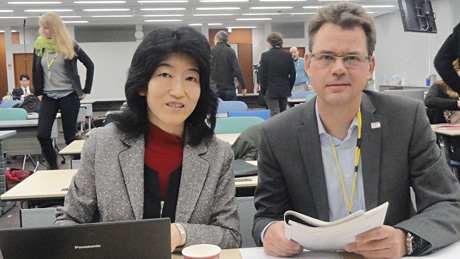Technology for Aging

- The organizers of the workshop: Engineering professor Mihoko Otake and geriatric psychologist Mike Martin. (Image: Rahel Wartenweiler)
UZH News: Mike Martin, the Aging, Health and Technology workshop was a forum for researchers to talk about healthy aging and discuss what technologies could be used to promote it. Why would you say it makes sense for Japan and Switzerland to collaborate on research into aging and health?
Mike Martin: Japan and Switzerland are among the top three countries worldwide in terms of life expectancy. But Japan is ten years ahead of Switzerland in terms of demographic aging, with 29 percent of the Japanese population already over age 65. In Switzerland this age group accounts for only 18 percent of the population, although in ten years’ time it is likely to have reached the level of Japan. This makes cooperation with Japan on research into aging especially interesting. The fact that both countries have a strong scientific and academic basis in terms of engineering, the social sciences, and medicine also creates a good foundation for cooperation. Research into aging, health, and technology requires the interplay of all these disciplines.
Is the use of modern technologies in Japanese health care more widespread than in Switzerland?
Yes, that’s my impression. Mihoko Otake, the engineering professor who co-organized our workshop, has an interesting example of her own: She’s developed a social robot that’s used in community centers in Japan to moderate group discussions. It films the people taking part and analyzes who speaks and smiles, and how much. If a particular person speaks for longer than agreed in advance, the robot interrupts and gets someone who hasn’t said anything yet to speak. This way it facilitates social interaction and communication. At the same time modern technologies are playing a useful role in enabling us to do research into health – and how to preserve it into old age – in the first place.

How do you mean?
We’re at a crossroads in terms of health research. Until now most of it has taken place in the lab. For example you get subjects to fill out a questionnaire, do blood work on them, or have them do a fitness test. In the past this work has often only taken account of one aspect of health. But what you need is a complete picture of a person and their health. Modern technologies make this easier. People can be equipped with smartphones and wearable sensors so they can gather data themselves as they go about their daily lives.
The problem is that the more aspects of life researchers manage to integrate, the more difficult it becomes to interpret the data. This makes collaboration between disciplines such as medicine and the social sciences all the more important.
What conclusions did the workshop reach?
Everyone taking part agreed that there’s great potential for using modern technologies in the service of health, especially health in old age. So far this technology has been used almost exclusively for people who are ill. But the numbers of healthy older people are much greater, and these people would also benefit in terms of preserving their quality of life.
Our workshop was also designed to enable us to exchange these technologies and share know-how between Switzerland and Japan. In the next few weeks we’ll see what concrete joint projects will emerge from discussions at the workshop in Tokyo.
Mike Martin is Professor of Gerontopsychology, Director of the Gerontology Competence Center, and co-founder of the Dynamics of Healthy Aging University Research Priority Program (URPP) at the University of Zurich.